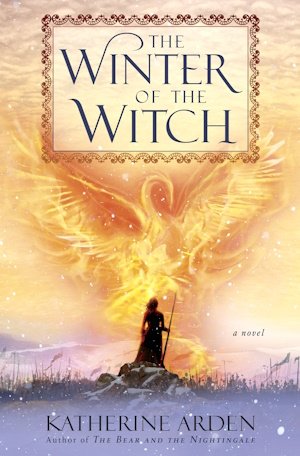FINGERS TANGLED IN HER horse’s mane, leaning on his broad, warm shoulder, she barely heard the Bear speak. “Well, this is all touching.
But I am off. I have a world to see and her promise for my freedom, brother. ” This last was added warily to Morozko. Vasya saw, when she opened her eyes, that the winter-king was eyeing his twin with undimmed suspicion.
“You are still bound to me,” said Vasya to the Bear. “And to your promise. The dead will not rise.”
“Men create enough chaos without me,” said the Bear. “I am just going to enjoy it. Perhaps give a few men nightmares.”

“If you do worse,” said Vasya, “the chyerti will tell me.” She raised her golden wrists, a threat and a promise.
“I will not do worse.”
“I will call you again,” she said. “If there is need.”
“So you will,” he said. “I may even answer.” He bowed. And then he was gone, swiftly lost in the gloom.
THE BATTLEFIELD WAS EMPTY. The moon had risen, somewhere behind the clouds. The field was stiff with frost. The dead lay open-eyed, men and horses, and the living moved among them by torchlight, looking for dead friends, or stealing what they could.
Vasya looked away.
The chyerti had already slipped away, back to their forests and streams, holding Dmitrii’s promise, and Sergei’s, and Vasya’s.
We can share this land. This land that we have kept.
Three chyerti remained. One was Morozko, standing silent. The second was a woman, whose dawn-pale hair slanted across the darkness of her skin. The third was a little mushroom-spirit, who glowed a sickly green in the darkness.
Vasya bowed to Ded Grib and Polunochnitsa, straight-shouldered and solemn, though she knew her face was swollen and blotched like a child’s with grief and with painful joy. “My friends,” she said. “You came back.”
“You had your victory, lady,” returned Midnight. “We are witnesses. You made your promises and you kept them. We are yours in truth, the chyerti. I came to tell you that the old woman—she is glad.”
Vasya could only nod. What care had she for promises, either kept or broken? The price had been too high. But then she licked her lips and said, “Tell—tell my great-grandmother that I will come to her, in
Midnight, if she will permit. For I have much to learn. And thank you. Both of you. For your faith. And your lessons.”
“Not tonight,” put in Ded Grib, in his high voice, practically. “You aren’t learning anything tonight. Go and find somewhere clean.” He fixed Morozko with a dark look. “Surely you know a good place, winter-king. Even if your realm is too cold for mushrooms.”
“I know a place,” said Morozko.
“I will see you beside the lake, in the moonlight,” said Vasya to Ded Grib and Polunochnitsa.
“We will wait for you there,” said Midnight, and then she and Ded Grib were gone as suddenly as they’d appeared.
Vasya leaned against Solovey’s shoulder and the grief and the joy bewildered her equally. Morozko cupped his hands. “Let us go,” he said. “At last.”
Without a word, she put a foot in his hands and let him boost her onto Solovey’s back. She did not know where they were going, save that it was the direction her soul told her was away. Away from the sound and the smell, the glory and the futility.
Solovey carried her gently, neck arched, and Pozhar, glowing in the darkness, shed heat upon them both.
Finally they crested a small rise. The whole blood-drenched battlefield lay clear at their feet. Vasya dismounted and went to Pozhar.
“Thank you, lady,” she said. “Will you fly free now, as you have long wished to do?”
Pozhar lifted her head, aloof, and her nostrils flared, as if to test the winds of heaven. But then she bent her golden head, delicately, and lipped Vasya’s hair. I will be at the lake when you return, she said. You may prepare a warm place for me on stormy nights, and comb my mane.
Vasya smiled. “It will be done,” she said.
Pozhar slanted her ears back a fraction. Do not neglect the lake.
For it will always need a guardian.
“I will guard it,” said Vasya. “And I will watch over my family. And I will ride the world, in between times, through the farthest countries of dark and day. It is enough for one life.” She paused. “Thank you,”
she added to the mare. “More than I can say.”
Then she stepped back.
The mare threw her head up, small flames licking at the edge of her mane. One ear slanted toward Solovey, perhaps with a touch of coquetry. He rumbled softly at her. Then the mare reared—up and up. Her wings flared, brighter than the pale morning sun, gilding all the snowflakes, making shadows of the whirling snow. Then the firebird soared aloft in a rush of glory. Men who watched from afar later told each other that they had seen a comet, a sign of God’s blessing, flying between heaven and earth.
Vasya watched Pozhar go, eyes fixed on the brightness, and only looked down when Solovey nudged her in the small of her back. She buried her face in her horse’s mane, breathed the reassuring smell of him. He had none of Pozhar’s alarming tang of smoke. She could even, for an instant, forget the smell of blood and filth, fire and iron.
A coolness at her back, and she lifted her head and turned.
Morozko had dirt under his nails, a streak of soot on his cheek. The white mare behind him looked as weary as he, her proud head hanging low. She nuzzled Solovey, her colt, once, lightly.
Morozko looked weary, as men are weary, at the end of long labor.
His eyes searched her face.

























